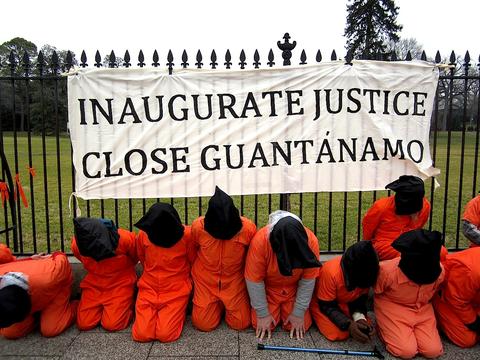The Relentless Importance of Closing Guantánamo

"Inaugurate justice, close Guantánamo": A banner fastened to the fence of the White House, on January 11, 2013, the 11th anniversary of the opening of the prison, by activists with the campaigning group Witness Against Torture (Photo: Andy Worthington via Flickr).
By Andy Worthington, February 12, 2013
Two weeks ago, there was a flurry of activity in the mainstream media when it was announced that the State Department had reassigned Daniel Fried, the special envoy for closing the "war on terror" prison at Guantánamo, and would not be replacing him. As Charlie Savage explained for the New York Times, "Mr. Fried’s office is being closed, and his former responsibilities will be 'assumed' by the office of the department’s legal adviser," according to an internal personnel announcement.
The Times article continued: "The announcement that no senior official in President Obama’s second term will succeed Mr. Fried in working primarily on diplomatic issues pertaining to repatriating or resettling detainees appeared to signal that the administration does not currently see the closing of the prison as a realistic priority, despite repeated statements that it still intends to do so."
The article also noted that Fried, a career diplomat, had "traveled the world negotiating the repatriation of some 31 low-level detainees and persuading third-party countries to resettle about 40 who were cleared for release but could not be sent home because of fears of abuse," adding, that "the outward flow of detainees slowed almost to a halt as Congress imposed restrictions on further transfers, leaving Mr. Fried with less to do."
Although the media largely spun the story to stress Charlie Savage's suggestion that "the administration does not currently see the closing of the prison as a realistic priority," it was actually more significant that Mr. Fried's work had largely come to an end following the release of nearly 70 prisoners in 2009 and 2010.
However, the downturn in his work was not primarily because of Congress. The good will of countries around the world to take prisoners who could not be safely repatriated had largely dried up by the summer of 2010 -- a situation that was not aided, it should be noted, by America's own refusal, at every branch of the government, to bring any of these men to live in the U.S. -- and the President himself contributed to the deadlock. He quashed a plan by Greg Craig, the White House Counsel, to bring a handful of wrongly detained Uighurs (Muslims from China who could not be safely repatriated) to live in the U.S., when Republican critics caught wind of it, and he also imposed a ban on releasing any Yemenis from Guantánamo, following a hysterical backlash after a failed plane bomber, Umar Farouk Abdulmutallab, a Nigerian recruited in Yemen, tried and failed to blow up a plane bound for the U.S. on Christmas Day 2009.
This was particularly outrageous, because the President's own interagency Guantánamo Review Task Force, consisting of around 60 career officials and lawyers from the main government departments and the intelligence agencies, had concluded that 86 of the 166 men still held should be released, and two-thirds of these men are Yemenis.
By refusing to stand up for these men, President Obama consigned them to rot in Guantánamo, a situation that was only compounded when Congress imposed onerous restrictions on releasing prisoners to any other countries that lawmakers regarded as dangerous. That, it turns out, appears to include almost every country on earth.
Of the 86 cleared men, 56 are Yemenis, whose fate rests with President Obama, leaving 30 others who no longer have even the nominal representation of Mr. Fried -- the last five Tunisians, five Algerians (see here and here, and also here), four Syrians, four Afghans, a Saudi, the last Palestinian, the last Tajik, the last three Uighurs, one prisoner from Libya, Mauritania, Morocco, Sudan and the United Arab Emirates, and Shaker Aamer, the last British resident in the prison.
As Guantánamo settles into its twelfth year of operations, President Obama needs to show that he can do more than just talk about the ongoing need to close the prison, a position that was expressed to the New York Times by Ian Moss, a spokesman for Daniel Fried’s office, who said that the closure of the office "did not mean that the administration had given up on closing the prison," as the Times put it. Mr. Moss said, “We remain committed to closing Guantánamo, and doing so in a responsible fashion. The administration continues to express its opposition to Congressional restrictions that impede our ability to implement transfers.”
To add meaning to these words, we issue the following requests to President Obama:
1: Lift the ban on releasing any of the 56 cleared Yemenis from Guantánamo, imposed in January 2010.
2: Appoint a new person to deal specifically with closing Guantánamo, to find new homes for the cleared prisoners in need of assistance.
3: Take the fight to Congress to stop treating the cleared prisoners as pawns in a cynical game of political maneuvering, and to clear the way for all 86 cleared prisoners to be repatriated or safely rehoused in other countries.
Please help us by writing to President Obama, and to Secretary of State John Kerry:
President Barack Obama
The White House
1600 Pennsylvania Avenue NW
Washington, DC 20500
or email the President.
Secretary of State John Kerry
U.S. Department of State
2201 C Street NW
Washington, DC 20520




